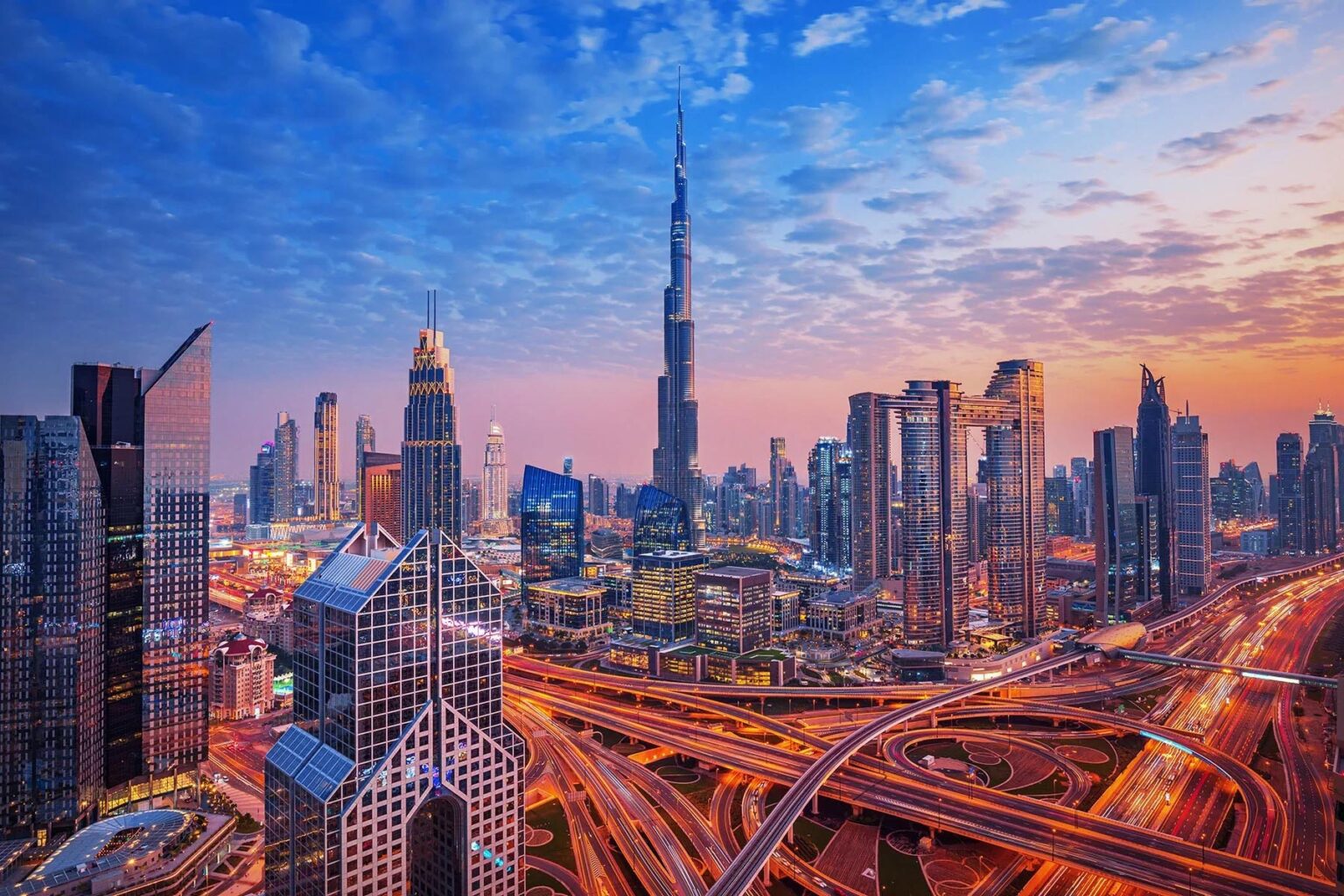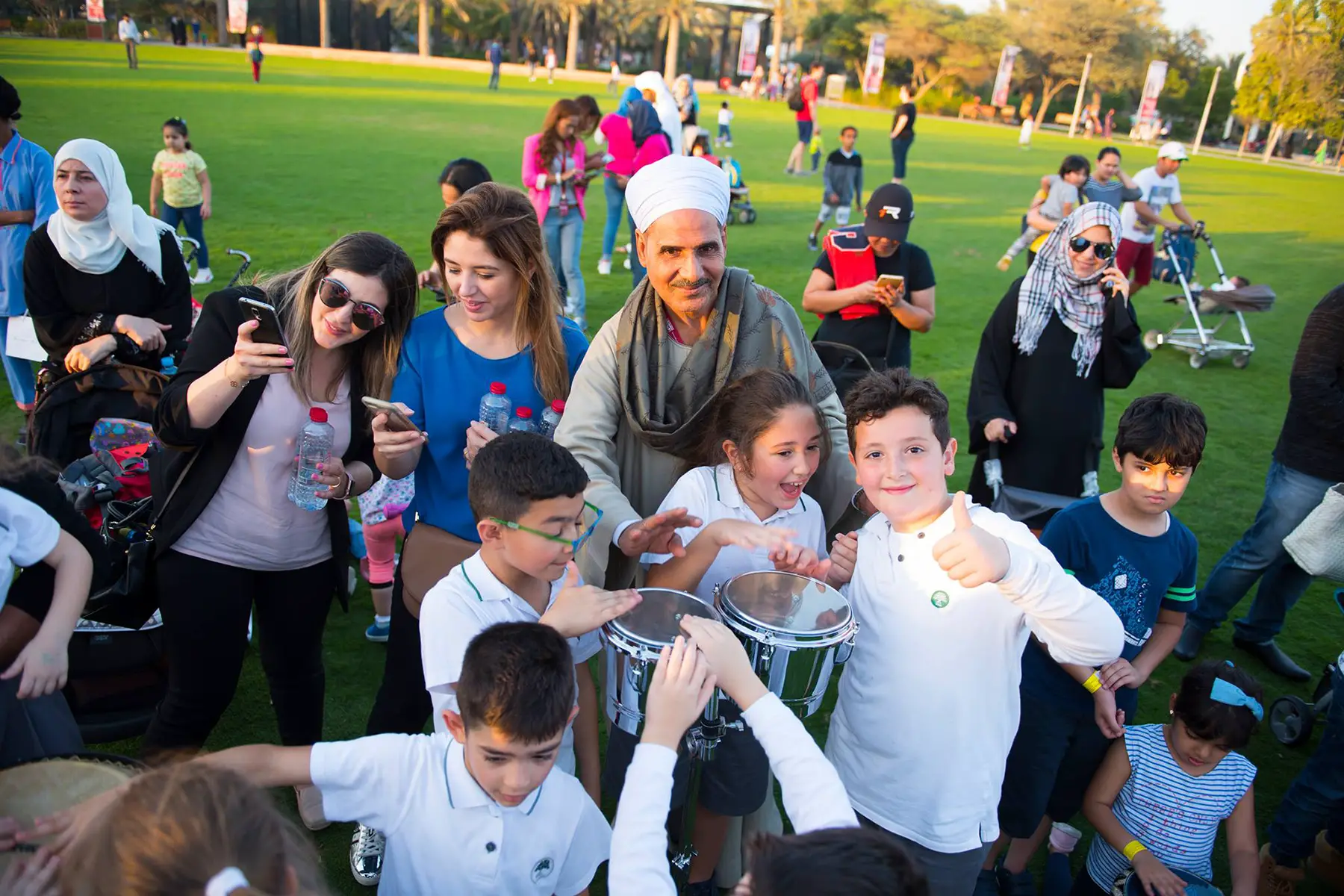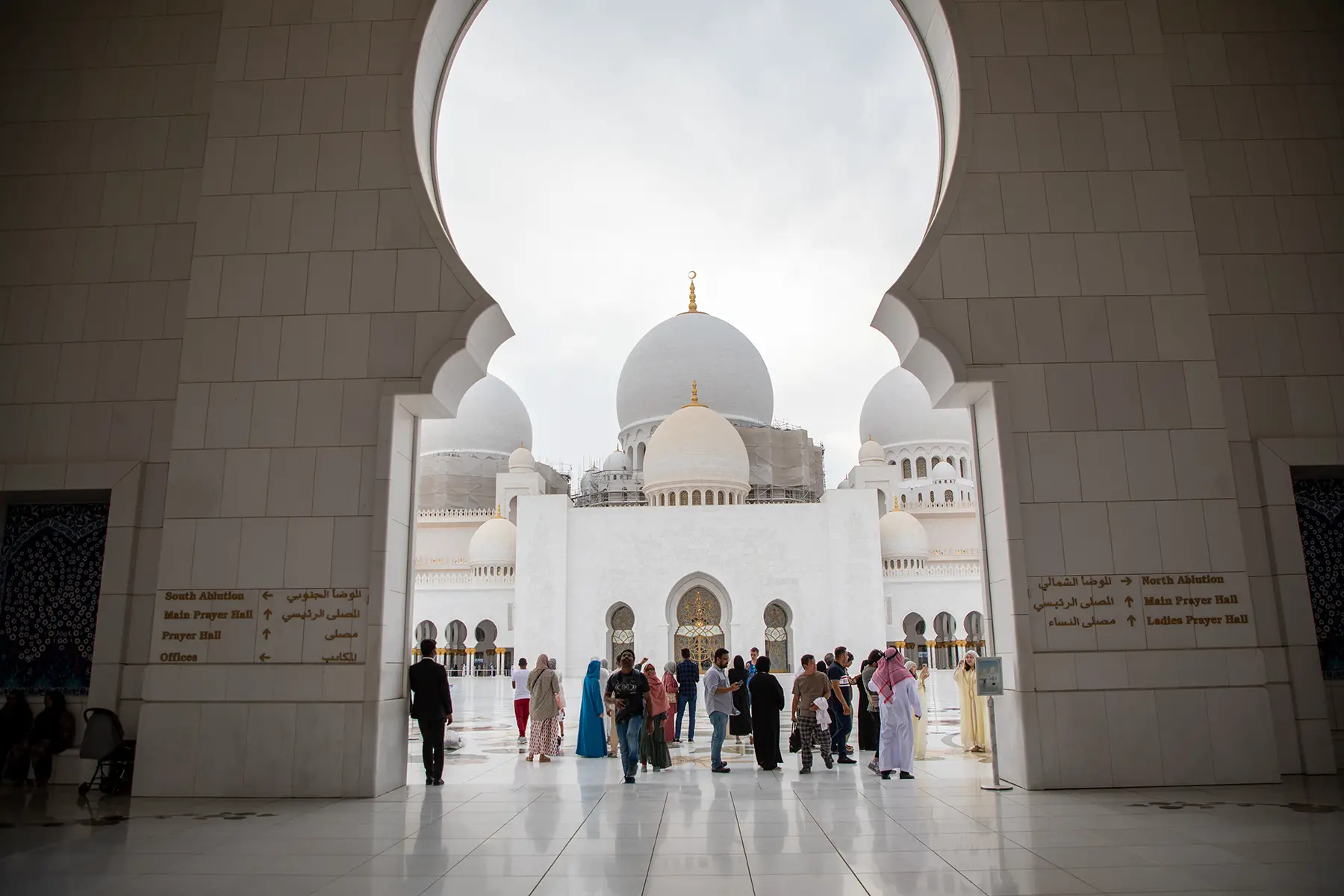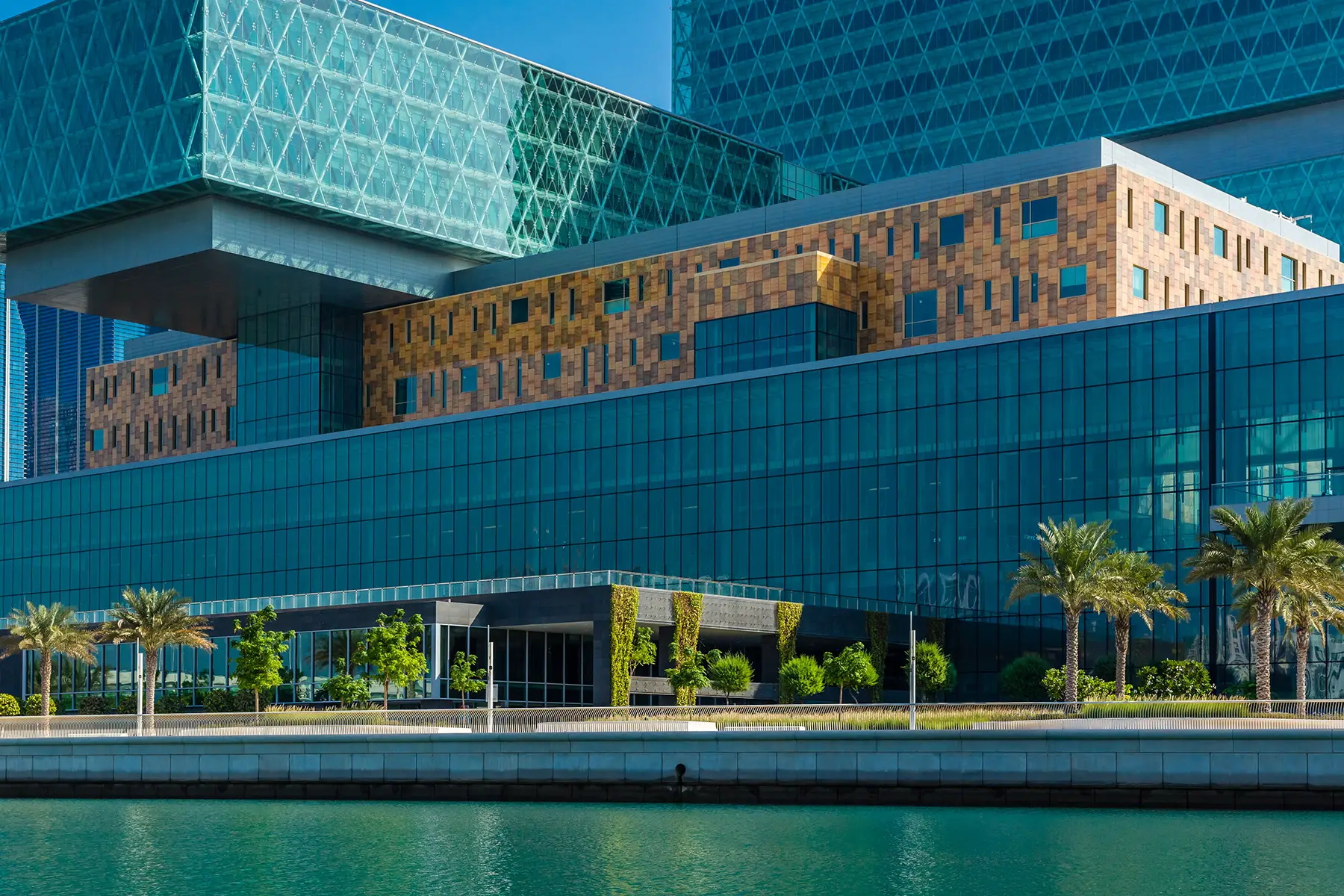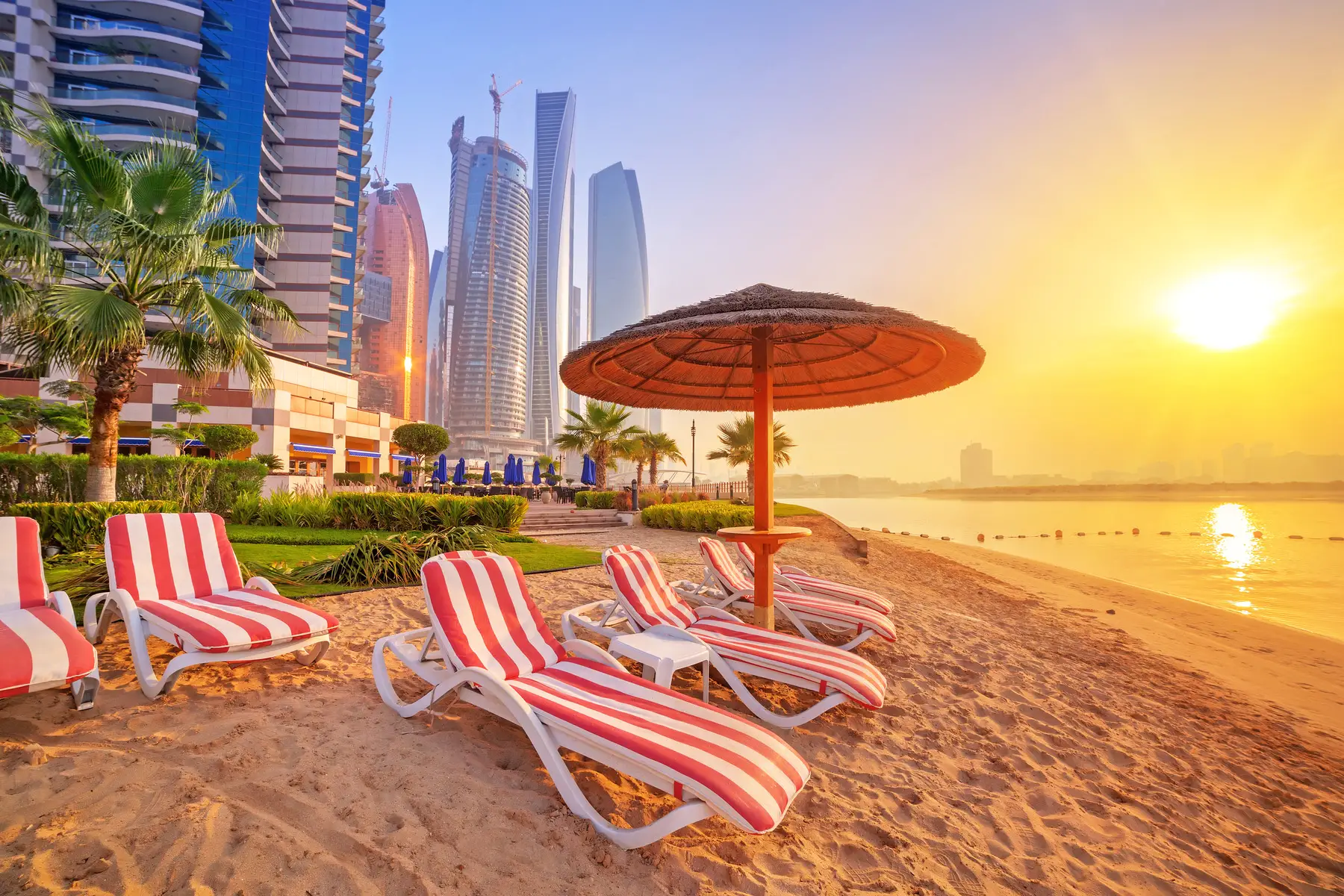The United Arab Emirates is a country of balanced contradictions. At the intersection of tradition and modern advances, life here is one of a kind. This helpful guide serves as an introduction to the United Arab Emirates for expats considering moving there. From major cities to education, to the structure of the work week, it provides everything you need to know about life in the UAE.
The guide includes the following information:
- Living in the United Arab Emirates
- Geography of the United Arab Emirates
- Main cities in the United Arab Emirates
- United Arab Emirates: facts and figures
- United Arab Emirates: key historical dates
- Economy and living standards in the United Arab Emirates
- People and society
- Lifestyle and culture
- Food and drink
- Politics, government, and administration
- Rights and freedoms
- Crime and policing
- Health, welfare, and social security
- Education in the United Arab Emirates
- Work and business in the United Arab Emirates
- Environment and climate in the United Arab Emirates
- Great places to visit in the United Arab Emirates
- Public holidays in the United Arab Emirates
- United Arab Emirates: myth-busting
Living in the United Arab Emirates
The UAE is a massive expat hub, with 8.84 million foreigners making up 88.4% of the population. The Emirates tempts people for many reasons – high salaries, a luxurious lifestyle, fun outdoor activities, and more. Subsequently, as an expat, you can have many different lives there. Want to spend most of your time in lush hotel bars, dancing the night away? Easy. Prefer to travel to Asia, Europe, or Africa during your (often generous) days off? Check. Want to save up for a house or retirement, or some other dream of yours? You can make that happen.
While living in the UAE can help you achieve your big life goals, it can also seem paradoxical. Modernism and tradition exist side-by-side, and people from every corner of the globe gather here. Despite this fact, there are significant divisions between the life of expats and locals, and between low-income and high-income expats. These differences can be shocking; as most expats in the UAE know, life there is precisely what you make it.
Geography of the United Arab Emirates
The UAE is a small, mostly desert-like country that covers 83,600 square kilometers. It is comprised of seven emirates, each ruled by different leaders from different royal families. These are Abu Dhabi, Dubai, Sharjah, Ras al Khaimah, Fujairah, Ajman, and Umm al Quwain.
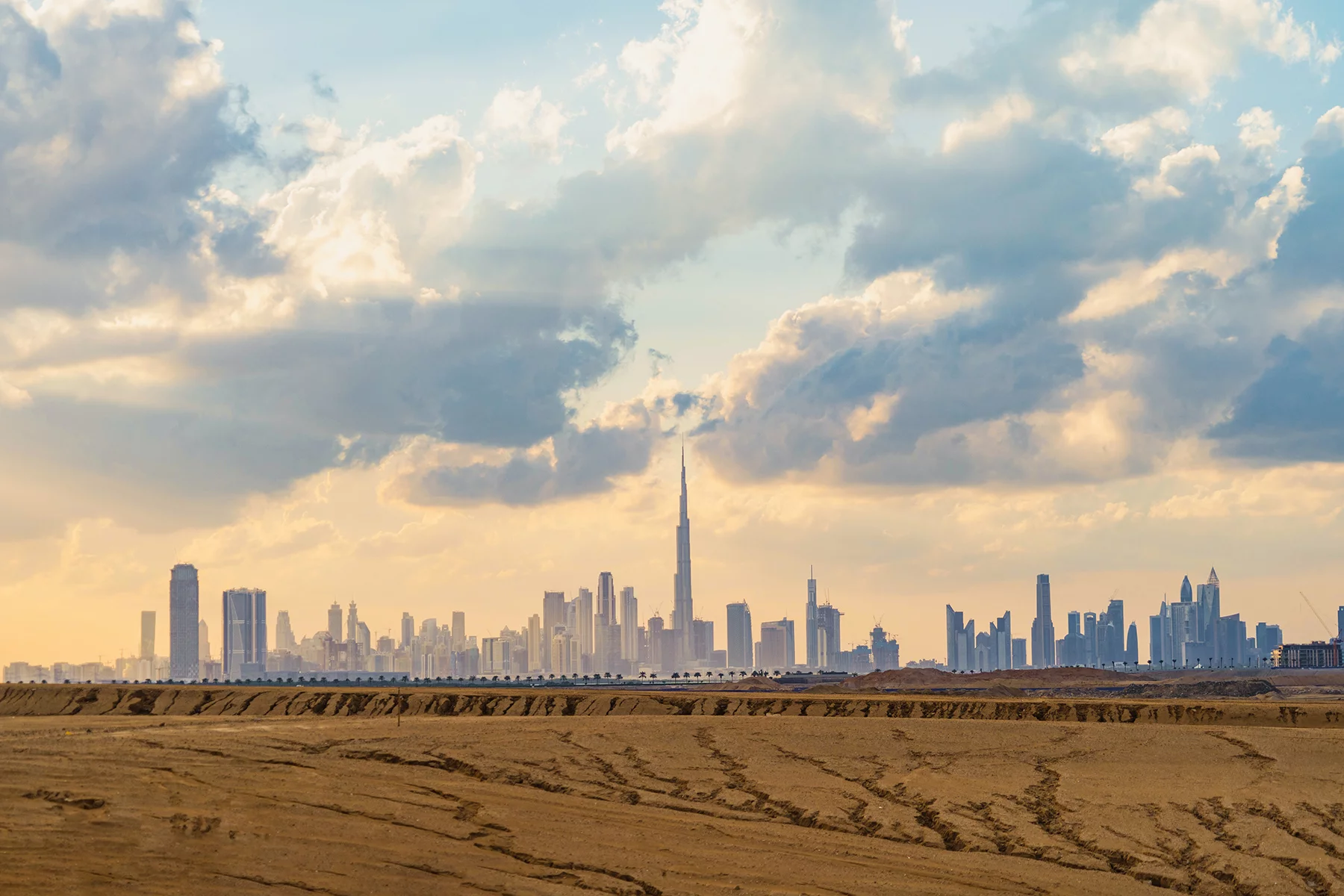
The UAE borders the Persian Gulf to the north, Saudi Arabia to the south and west, and Oman to the east. Oh and, of course, it is hot! With temperatures regularly at, or above, 40 degrees Celsius in the summertime, you’ll be glad to know that air conditioning is essentially a national treasure.
Main cities in the United Arab Emirates
Dubai
The glamorous heart of the UAE, Dubai hosts some of the nation’s tallest skyscrapers. Here you will find huge shopping malls (the largest in the country), lavish hotels, a very clean Metro, and a dizzying nightlife. Over 3.5 million live in Dubai with expats making up over 80% of the population. Dubai has a lot to offer, however, do keep in mind that it is one of the most expensive Emirates to live in, too.
Abu Dhabi
A less populous, less famous, but larger Emirate, Abu Dhabi is the richest of the seven. Its population is 1.8 million people and sits on vast oil deposits. Abu Dhabi is the seat of the President of the country.
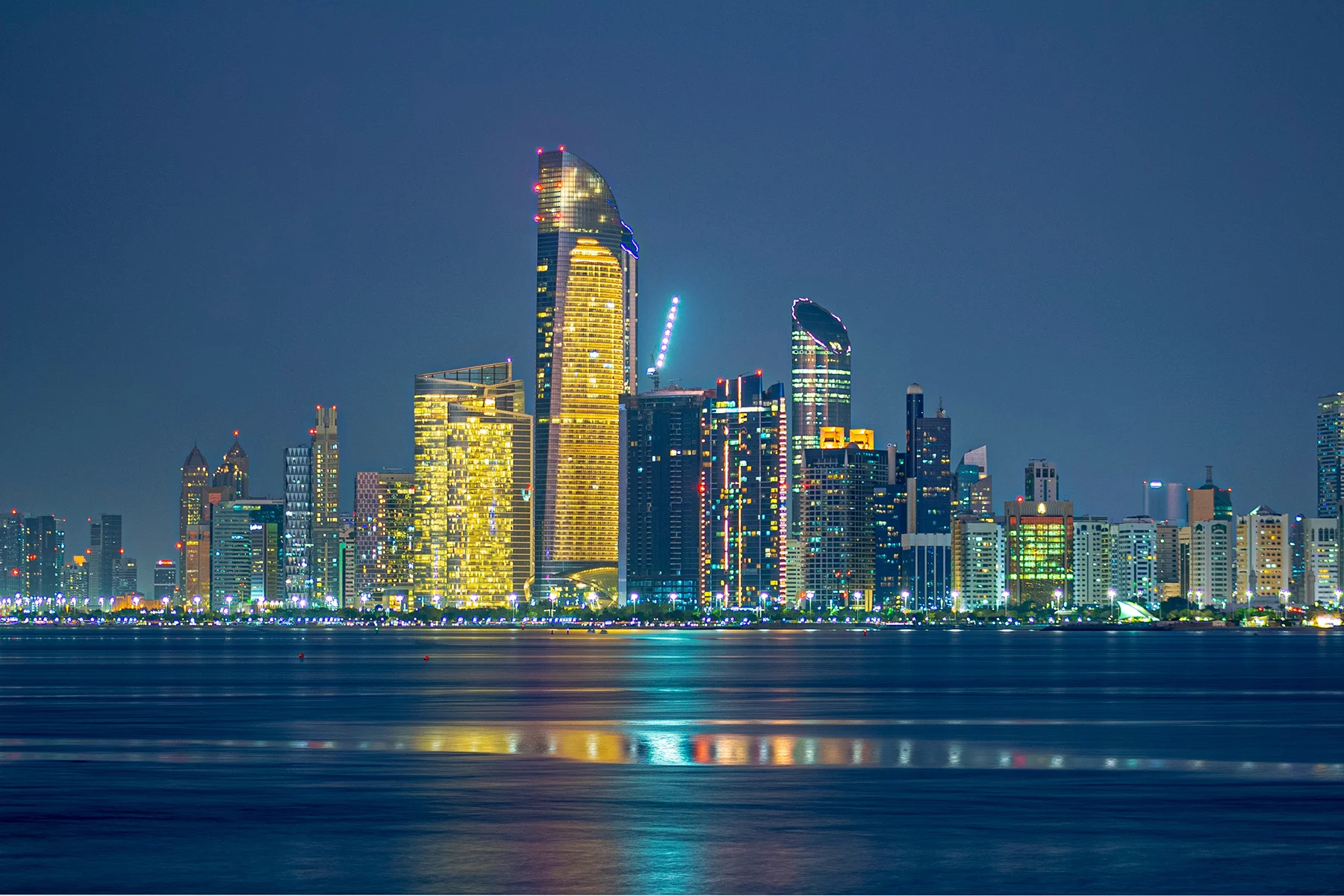
It is a quieter emirate, with more family accommodation available in the suburbs. Here you will find theme parks galore, as well a Formula 1 Grand Prix racetrack – which you can walk or run around during the week!
Sharjah
Sharjah, with its 1.73 million residents, is the UAE’s third-largest Emirate and has been ruled by the same family since 1600. The city is rich with museums and cultural attractions and has a thriving population of university students. The pace in Sharjah is slower but, according to many expats, also enriching.
United Arab Emirates: facts and figures
- People of more than 200 nationalities live and work in the UAE; the largest population represented is India.
- Abu Dhabi is the largest emirate, taking up 87% of the country.
- There is a serious gender imbalance in the UAE: 69% of the population is male, while 31% is female.
- The UAE doesn’t charge income tax – that’s a big part of why people find it so easy to save here.
United Arab Emirates: key historical dates
The UAE as a country was born on 2 December 1971, which is now called National Day. Annual cultural festivities mark this day, and people usually celebrate by decorating their cars, homes, or the streets. Most people will have this day off work, too. 1 December marks Commemoration Day, which recognizes the men who gave their lives in service of the UAE. Another key date is 16 December 2006, when the first batch of Emiratis became eligible to vote.
Economy and living standards in the United Arab Emirates
The UAE is extremely wealthy. Because the number of citizens is so low, and because there are very few government benefits available to non-citizens, poverty within the local population exists. However, this isn’t very common. In fact, the GDP per capita is just over $43,000. The UAE’s currency is the Emirati dirham and it is tied to the US dollar; therefore, it stays very stable. Although the cost of goods does tend to rise over time, the changes usually stay within a normal range.
The standard of living for local Emiratis and high-income expats is high. As long as your expenses aren’t too high, you should be able to comfortably afford necessities (housing, gas, car, and other bills) as well as luxuries (house help, eating out, and pursuing hobbies and activities). The amount that you will be spending and saving each month varies significantly between the Emirates; Dubai being the most expensive, followed by Abu Dhabi. That said, most expats in the UAE find that, if they want to, they can add significantly to their savings account during their tenure.
People and society
The UAE has a population of nearly 10 million and people from every corner of the globe live within its borders. Like most Gulf countries, expatriates (89%) outnumber local citizens (11%) and you are just as likely to hear Arabic as Hindi, English, and Tagalog. Although Islam is the national religion, practicing other religions is legal, and there are Christian, Hindu, and Sikh communities in the country.
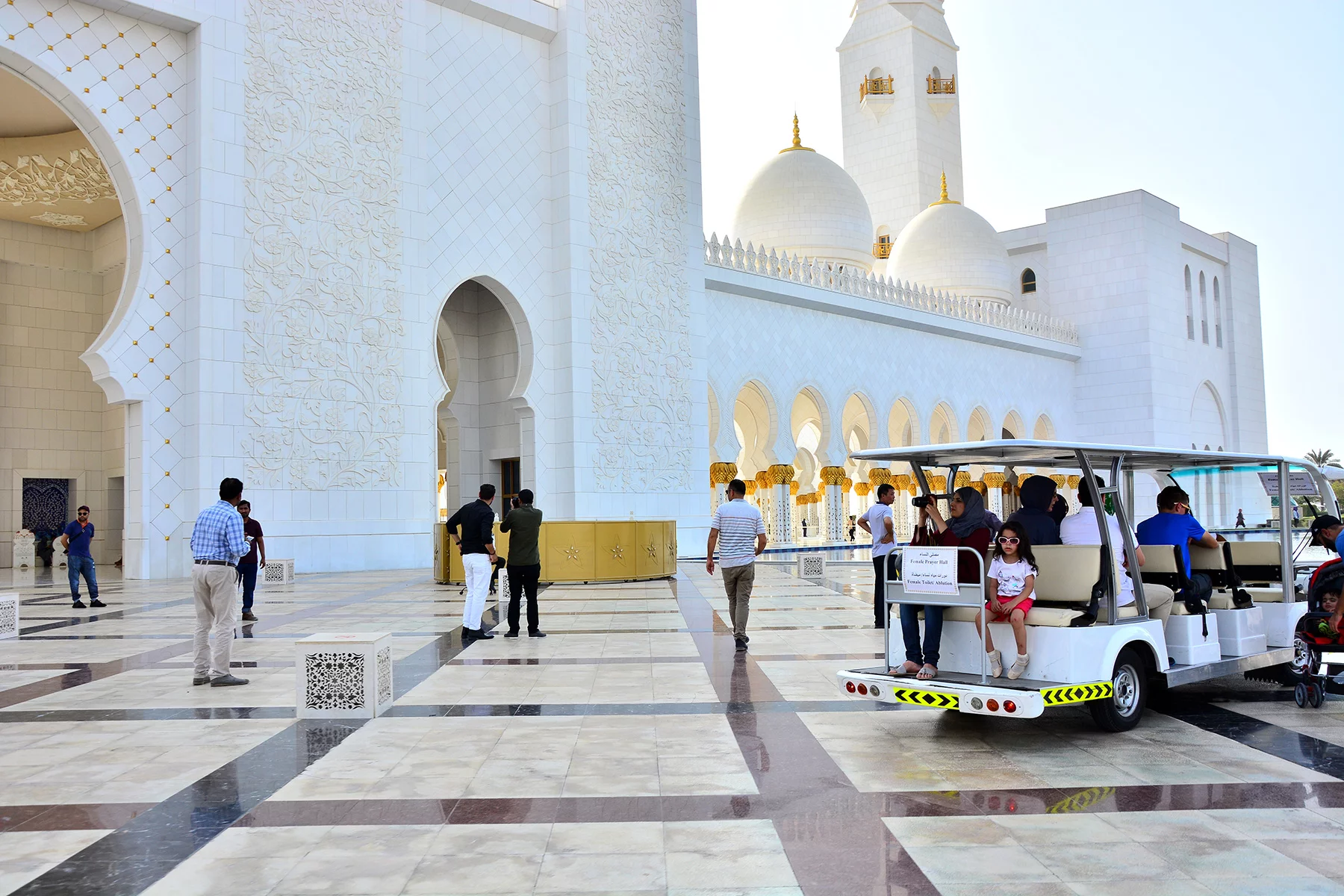
Although people from all over the world gather in the UAE, the country is at its core a conservative Muslim one. Expats should respect this reality, research the laws of acceptable behavior in the UAE, and dress modestly in most public spaces. While divorce is legal, it is also important to bear in mind that gay relationships, pregnancy outside of marriage, and indecent behavior are all illegal in the Emirates.
Class differences
A final reality to keep in mind is that high-income expats are treated very differently to low-income expats. Whereas expats from countries like Ireland or Australia are offered generous benefits packages, those from Pakistan and Bangladesh often suffer labor abuses and other poor treatment. The difference in treatment based on passports is blatant.
Lifestyle and culture
Expats rave about the wonderful lifestyle in the UAE and it’s true that you can cater it to your preferences. For avid shoppers, malls, boutiques, and souks are everywhere – in fact, you will know you have settled when you start using malls as landmarks for giving directions.
Culture buffs will discover movie theaters, salsa classes, and a procession of popular artists from all over the world who perform in the Emirates. You can catch movie and book festivals, visit world-class museums, and explore whatever hot new restaurants are opening.
Food and drink
Many an expat is thrilled with the dining scene in the Emirates. From Nepalese to Brazilian, Ethiopian to Korean, the variety of food available is enough to spoil you. Dubai is also home to some of the most amazing rooftop bars.

Better still, many of the most delicious options are affordable. Going out for a coffee, a nice meal, or an all-you-can-eat brunch is definitely part of the culture in the UAE; so, be sure to wear your stretchy pants!
Politics, government, and administration
The political structure of the UAE is a federal presidential elected monarchy. Each emirate has its own royal family and local government, and the ruler of each emirate is a member of the Supreme Council. Together, this seven-ruler body appoints a president and a prime minister in five-year intervals (no term limits). However, Dubai and Abu Dhabi essentially have veto power over big decisions.
Although Emirati citizens are slowly being allowed to elect candidates to the Federal National Council (an advisory group), most still can’t vote. There are no political parties and Emiratis have no say over their rulers.
Rights and freedoms
The UAE ranks low (124th place) on the Human Freedom Index. Even though expat havens like Dubai and Abu Dhabi can feel just like your home country, it is important to remember that the UAE is a Muslim country. Although there are some laws that are not enforced or that are selectively enforced, the truth is that simply living in the UAE puts you under the jurisdiction of some fairly stringent laws.
These include punishments for immoral behavior and limited freedom of expression. Same-sex couples can be jailed for years for consensual sex, depending on the emirate. As an expat, you should do your homework, understand your rights, and always have a backup plan.
Crime and policing
Whenever moving to a new country it is logical to worry about safety. That said, the UAE is very safe and ranks as the 26th most peaceful country in the world. Although crime does happen, it is usually only petty offenses such as pick-pocketing or street harassment.
Even so, crime is rare; in fact, the most dangerous act you can expect in the UAE is braving the highway drivers. Despite a decrease in the rate of car accidents, they still kill hundreds of people each year. If you have an emergency, your best bet is to call 999 and they will help you.
Health, welfare, and social security
The Emirati government takes healthcare very seriously and has invested heavily in bringing world-class facilities to its shores. These investments are paying off with life expectancy rates now at 75 and 78 for men and women, respectively.
From general care to specialized healthcare for women, most people can meet their health needs within the UAE, though expats may have to pay more for it.
In the UAE, non-residents incur higher healthcare costs than residents. For new arrivals and digital nomads living in the country, health insurance from these international providers can offer protection against unexpected medical emergencies:
You can use these policies to bridge coverage gaps after your move and during your stay, but if you plan to live in the UAE long-term, you may need to subscribe to a health insurance plan with a regulated local provider.
Education in the United Arab Emirates
The UAE is a highly literate country, with literacy rates around 98%. Education is mandatory and free for Emiratis all the way through primary school and high school – and at least 80% of all boys and girls apply to university.

Most expats choose to enroll their children in high-quality international schools throughout the Emirates; these offer IB, GCSE, and AP classes. For those who choose to stay in the Emirates after high school, there are plenty of international chapters of globally renowned universities located in the UAE.
Work and business in the United Arab Emirates
The UAE’s rate of unemployment currently stands at 3.1%. The workweek runs from Sunday to Thursday and working hours depend entirely on the field.
General businesses may run from 08:00 or 09:00 to 17:00 or 18:00; banks, however, may end their days at 14:00 and restaurants at 23:00. The largest industry by far is petroleum and petrochemicals, although tourism also draws in millions of visitors annually.
Almost anyone may start a business in the UAE. About 4% of the employed population in the country are self-employed. Foreigners may set up a company, but some types of business may require an Emirati partner.
Environment and climate in the United Arab Emirates
Most people, nearly 90% of the population, live in Emirati cities. The UAE’s climate is hot, arid, and rarely rainy. Because temperatures, especially between June and September, remain at around, or above, 40 degrees Celsius, recent expats must learn to hydrate and look for signs of heatstroke.
In the hot months, most businesses adjust to conduct more business in the cooler, evening hours. That said, the hardest adjustment will probably be the shocking contrast between the aggressively cold air conditioning in cars, malls, and other buildings, and the stifling heat of the outdoors.
Great places to visit in the United Arab Emirates
Burj Khalifa
Towering at 829.8 m high, the Burj Khalifa in Dubai is the tallest building in the world.
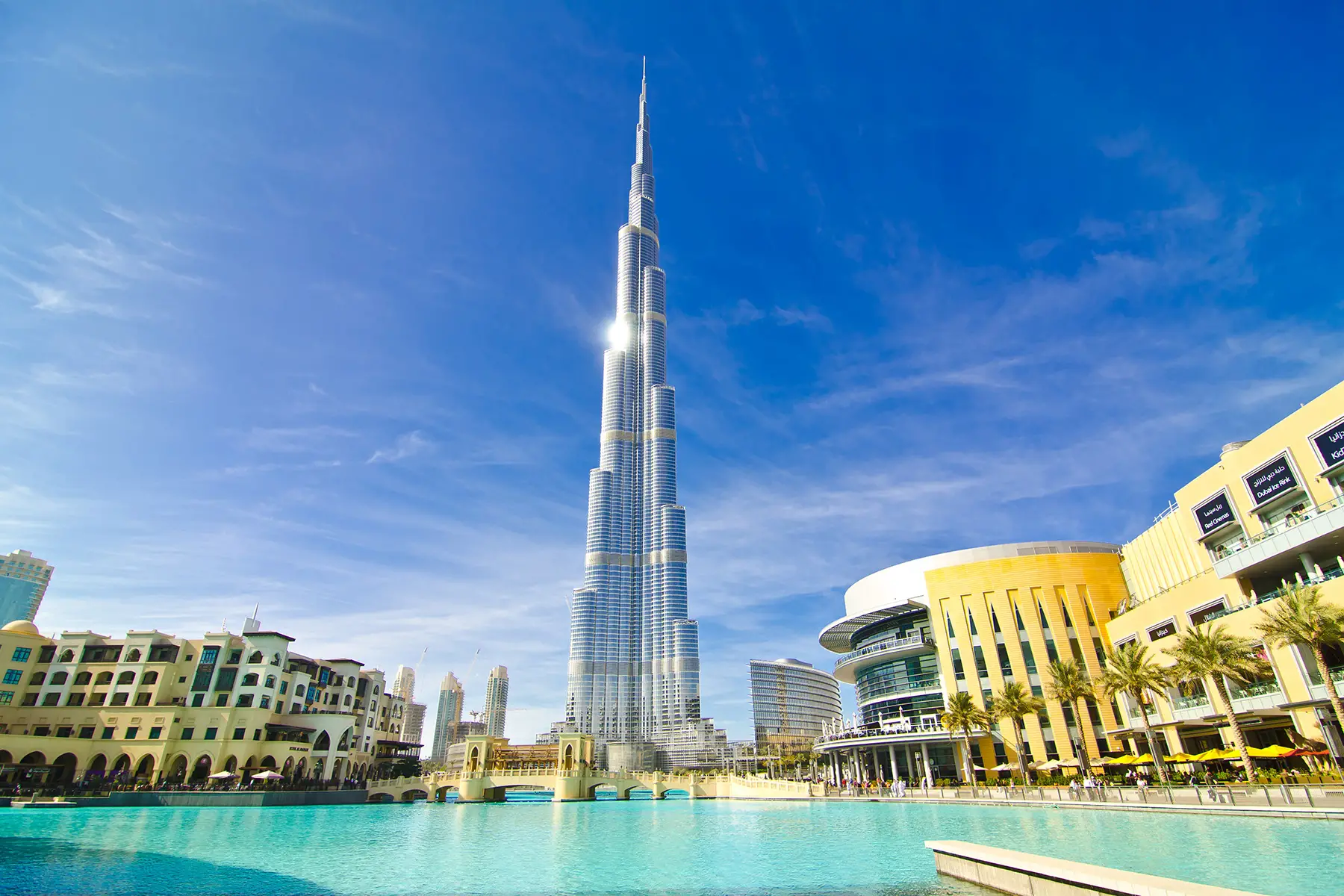
The 160-story landmark is a must-see and a popular spot among expats who fancy a taste of the lavish brunch at The Burj Club.
Sheikh Zayed Grand Mosque
The largest place of worship in the UAE, the Grand Mosque is a stunning sight to behold. More than 41,000 people gather here to pray during Eid celebrations. It is truly an Abu Dhabi gem.
Ferrari World
Yes, this is a Ferrari-themed amusement park, and no, it isn’t just for kids! For a little excitement in your life, hop on the world’s fastest roller coaster and earn lifetime bragging rights. Ferrari World is located on the outskirts of Abu Dhabi.
There also plenty of festivals in the country, so don’t miss out!
Public holidays in the United Arab Emirates
Some of the UAE’s public holidays are fixed (such as National Day or the Prophet Mohammed’s birthday on 9 November). For most others, like Ramadan or Eid, they are scheduled according to the phases of the moon and are announced in the weeks before. So, although you might have an approximate guess for Eid al Adha, schools and businesses won’t know for certain until the government announces it. The government regularly updates a list of public holidays on its website.
United Arab Emirates: myth-busting
- Women have to cover from head to toe: Although it is advisable to practice modesty in most public spaces, you are not required to cover your entire body or your head (unless you enter a mosque).
- You can’t drink alcohol in the UAE: Most hotels have licenses to serve alcohol, so you can drink and dance with your date to your heart’s content. There are also a few stores with licenses where you can pick up a bottle of wine for dinner.
- Islam is the only religion allowed: This just isn’t true. There are plenty of worship centers and churches in the UAE. The different day (Friday service instead of Sunday service) might take some getting used to, though.
